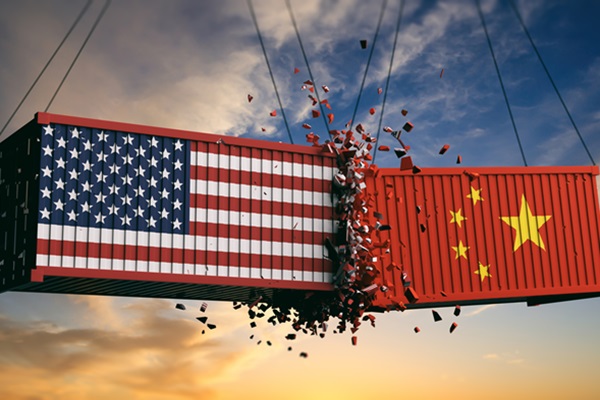.png)
Trump Tariffs Make Americans ‘Yippy’, And China Goes ‘Yippee’
The trade war helps China come out as the more stable, respectable and respectful superpower


T.K. Arun, ex-Economic Times editor, is a columnist known for incisive analysis of economic and policy matters.
April 11, 2025 at 2:05 PM IST
Using language that reflects the refinement of his thinking, President Donald Trump recently exulted that, in the wake of announcement of his steep reciprocal tariffs, heads of assorted governments have been queuing up to “kiss his ass” and negotiate lower rates. China does not figure in that list.
China has declared that it would not yield to blackmail, and matched Trump’s tariffs on its imports with 125% import duty on American exports to China. Chinese state media have been playing old clips from Mao Zedong, founder of the People’s Republic and leader of the People’s Liberation Army, which fought off the Japanese occupiers, along with the forces of Chiang Kai-shek, using materiel and training supplied by the Soviet Union, the US and Britain, and later on, forced Chiang Kai-shek and his forces to flee to Formosa. Mao’s clips show China’s Chairman reaffirm the nation’s collective determination to never give in to the enemy, keep fighting and finally prevail, whatever the odds.
Mao, most outsiders tend to think, has been discredited and discarded, after the fiasco of the Cultural Revolution and the success of the post-Mao efforts to redefine capitalist growth as Socialism with Chinese Characteristics. For a time, this was true, at least with regard to the urban elite. But widespread disillusionment with corruption, elitism of the party leadership and dysfunction in society has opened up a new wave of empathy with the Great Helmsman and his fellow revolutionaries. President Xi Jinping has been feeding and using this sentiment to legitimise his own policies.
China appears self-possessed and dignified, standing up against bullying by a would-be global hegemon. China is best placed to move into the space vacated by the US under Trump for underpinning a rules-based global trading system. The more capricious Trump’s policymaking, the greater the advantage China derives, presenting itself as the saner superpower, and ready to engage productively with all economies flinching from Trump’s arbitrary tariffs.
The US is the world’s largest economy, and accounts for 13.1% of global imports as WTO’s 2023 statistics. China is the world’s second largest economy, but accounts for roughly the same share of global imports as the US, if you include Hong Kong also as part of China. China is a bigger exporter, importing a great deal of raw materials, components, sub-assemblies and assemblies to create those export flows.
While the rich world, in particular the US, is the destination for a large chunk of China’s exports, China sources its minerals, soy beans and the like from Africa and Latin America, apart from Australia. All of the Southeast Asian economies, and Taiwan are sites of component production for China’s export powerhouses. Much of the developing world trades extensively with China, including India.
Till recently, China used to run up a trade surplus with the rich world and a deficit with the rest, so that overall, its surplus was not huge. But of late, that has changed. In 2024, China ran up a trade surplus of $992 billion. This $1 trillion dollar trade surplus is not an embarrassment, but also admission of serious flaws in the country’s economic policies. China has been talking of developing its internal circulation for years, but not succeeding in reining in its external circulation, or international trade.
China’s National People’s Congress, described in the western press, as the world’s biggest rubber stamp, at its 2025 session in mid-March, once again reiterated the need to expand domestic consumption and reduce dependence on exports. This is easier said than done. One way to boost consumption is to offer subsidies for replacing household appliances with new, more energy efficient models, on the lines of the ‘cash for clunkers’ scheme that the US launched in the wake of the global financial crisis that nearly demolished the American automobile industry, to replace gas-guzzling old vehicles with sleek new models. That is what the Chinese government is trying to do now.
However, what is fundamentally needed is a structural change in the economy. China has a developed manufacturing sector but a stunted financial sector. So, people have been saving for their future by buying one, two or even three homes. The recent crisis in the real estate sector has exposed the hollowness of this form of saving. Gold is now a favoured saving option. China needs a well-articulated financial service industry, with mutual funds, pension funds, insurance, annuities, and functional bond and derivatives markets, so that people can diversify savings to financial products, in order to secure their retired life.
American financial services companies see a big opportunity in this area. The Chinese are likely to leverage American eagerness to expand services trade to extract concessions in goods trade. They have made a beginning with Hollywood films, restricting the number of films that can be screened in China.
The most effective instrumentality would be a stronger yuan. That would reduce exports, make imports cheaper and boost imports as well as consumption. But a stronger yuan would go hand in hand with a higher rate of interest. Reduced exports to the US cannot be fully offset by increased exports to the rest of the world, except by inviting the wrath of domestic constituents in all the economies where would-be exports to the US are dumped. This would create distress in China’s industrial sector, and a higher rate of interest is the last thing such distress calls for.
China might need to find unconventional solutions to its export dependence. It could offer to scrap some domestic steel capacity, in return for enhanced access to Chinese electric vehicles, batteries, battery technology and renewable energy products in markets that restrict them at present. It could overhaul its household registration system, or hukou, to grant migrants in towns local residency and access to social security, healthcare and other benefits, saving the migrants the layers of living costs that those with local hukou are spared, which saving can be encouraged to move into additional consumption.
Beijing could scale back security aggression to improve relations with Japan, Korea and Australia, and boost trade with these economies, all of whom have been targeted by Trump tariffs, even if they remain suspended.
Beijing could use the trade war to accelerate the structural change it has been seeking in the domestic economy, and enhance its global standing, at the same time.



